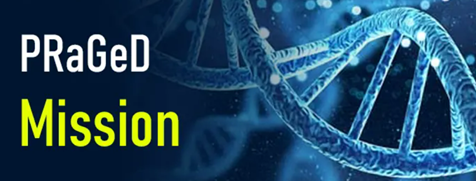Paediatric Rare Genetic Disorders (PRaGeD)

Disclaimer: Copyright infringement not intended.
Context
- The Hyderabad based Centre for DNA Fingerprinting and Diagnostics (CDFD), has initiated an inter-disciplinary approach to decode the genetic mutations that causes Paediatric Rare Genetic Disorders (PRaGeD).
Details
- The PRaGeD is a PAN-India initiative funded by the Department of Biotechnology (DBT), Ministry of Science and technology.
- The CDFD will be collaborating with paediatrics departments of medical colleges and centres across the country to analyse samples from children with rare genetic disorders and their parents.
What are genetic disorders?
- Genetic disorders occur when a mutation (a harmful change to a gene, also known as a pathogenic variant) affects our genes.
- Genes are made of DNA (deoxyribonucleic acid), which contain instructions for cell functioning and the characteristics that make us unique.
- People receive half of the genes from each biological parent and thus may inherit a gene mutation from one parent or both. Sometimes genes change due to issues within the DNA (mutations). This can raise the risk of having a genetic disorder.
- Rare genetic disorders are progressive, disabling and life-threatening in nature.
Genetic disorders can be:
- Chromosomal: This type affects the structures that hold the genes/DNA within each cell (chromosomes). With these conditions, people are missing or have duplicated chromosome material.
- Complex (multifactorial): These disorders stem from a combination of gene mutations and other factors. They include chemical exposure, diet, certain medications and tobacco or alcohol use.
- Single-gene (monogenic): This group of conditions occurs from a single-gene mutation.
What are common genetic disorders?
There are many types. They include:
Chromosomal disorders
- Down syndrome (Trisomy 21).
- FragileX syndrome.
- Klinefelter syndrome.
- Triple-X syndrome.
- Turner syndrome.
- Trisomy 18.
- Trisomy 13.
Multifactorial diorders
- Late-onset Alzheimer’s disease.
- Autism spectrum disorder, in most cases.
- Cancer, in most cases.
- Coronary artery disease.
- Migraine headaches.
- Spina bifida.
- Isolated congenital heart defects.
Monogenic disorders
- Cystic fibrosis.
- Deafness that’s present at birth (congenital).
- Duchenne muscular dystrophy.
- Familial hypercholesterolemia, a type of high cholesterol disease.
- Hemochromatosis (iron overload).
- Neurofibromatosis type 1 (NF1).
- Sickle cell disease.
- Tay-Sachs disease.
Wrapping Up
- The rare genetic diseases are a global public health concern with 350 million people affected worldwide and about 70 million Indians.
- The disease burden of rare genetic disorders in the country is close to 7 crore and nearly 30 per cent of children suffering from such diseases do not reach the age of five years. About 95 percent of rare diseases also do not have an approved drug for treatment.
- Paediatric Rare Genetic Disorders (PRaGeD) Mission is a welcome move that will decode the genetic mutations that cause Rare Genetic Disorders among children.
- The initiative will develop novel therapies, achieve genetic diagnosis, discover and characterise novel genes that cause the rare diseases, provide counselling and also create awareness among people.
- The PRaGeD is an important study for the entire country. This will not only enable us to identify the genetic mutations behind the rare diseases but also help in creating a database of rare genetic disorders, which will be available for researchers and clinicians.




1.png)
